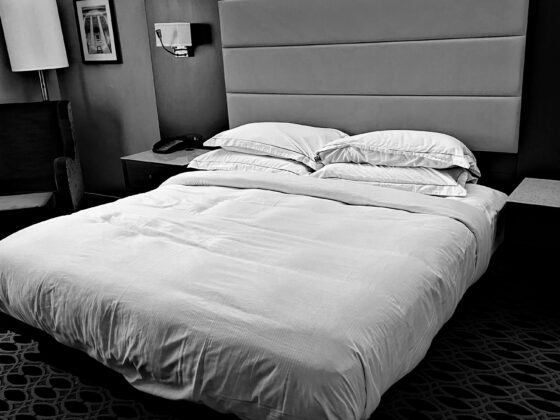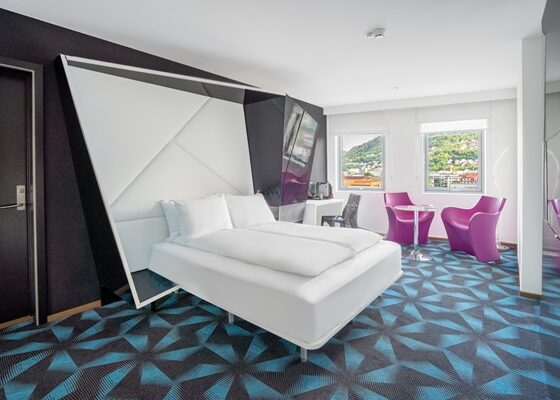
Human trafficking is a crime that can affect anyone regardless of sex, race, or origin. A widespread misconception is that trafficking only happens overseas, but it is occurring in cities, suburbs and rural communities throughout all 50 states.
Importantly, it is happening in the hospitality industry. Traffickers exploit hotels to further their criminal enterprise because they are perceived as anonymous and low risk locations, with one report finding that 80% of trafficking victims utilized hotels. Therefore, hospitality team members, from front desk to housekeeping, are uniquely positioned to observe, identify, and safely report potential instances of trafficking.
Trafficking prevention is not only the moral approach: in many states, it is the law. Approximately half of all states in the U.S. have enacted laws that mandate trafficking awareness for hospitality staff or require properties to post signage regarding reporting human trafficking. However, proactive measures can be taken long before an incident occurs on premises.
Additionally, trafficking prevention is essential to protecting a hotel’s bottom line: federal laws enabling trafficking victims to seek civil penalties against businesses that facilitate trafficking can result in costly damages.
Most recently, a Georgia hotel was ordered to pay $40 million to a victim who was trafficked multiple times on their premises. Prevention starts with creating a culture that embraces education and awareness. Awareness of the potential signs of human trafficking and familiarity with reporting protocols can enable hotel staff to help stop this crime before it takes place while also protecting the reputation and financial health of their business.
What Is Human Trafficking?
According to the United States Department of State, human trafficking is the exploitation of an individual for labor, services, or commercial sex. The Trafficking Victims Protection Act of 2000 defines and recognizes two kinds of human trafficking: sex trafficking and labor trafficking. Sex trafficking is the recruitment, harboring, or transportation of an individual for the purpose of commercial sex through force, fraud, or coercion. If a child is under the age of 18, no force, fraud, or coercion is required for it to be classified as sex trafficking.
Labor trafficking is the recruitment, harboring, or transportation of an individual for labor or services. Traffickers will exploit technology such as social media, dating apps, false online advertisements, or gaming platforms to manipulate their victims and offer false promises such as relationship, financial stability, employment, or housing.
What are the Signs?
As an organization that works closely with survivors, we often hear from them that trafficking can happen at any location — in any hotel, from budget to luxury resort. While trafficking happens 365 days a year, PACT wanted to understand if there were certain times when the risk of trafficking activities could be greater in hotels. We partnered with researchers who scraped social media posts for sexual services, and found that there was a spike leading up to large sporting events across the country.
Those findings mirror my own experience, as an attorney who had represented trafficking victims: they repeatedly shared that their traffickers were always excited for “game day,” because it meant a higher demand for sexual services and for exploitation. This is true leading up to the major events like the Super Bowl, but trafficking spikes any time there is a major tourism event, including concerts, business conventions, and even as we saw in 2024, Comic Con.
Hotel associates can learn to spot some fundamental red flags. Are guests traveling without luggage? Are they checking in with an older person who seems to be controlling their movements or identification? Are they easily startled, afraid, have their head down, and/or are avoiding eye contact? Do they provide scripted responses, or are not allowed to speak for themselves? Do they have any identifying marks or tattoos on their body? No one sign is definitive, and context is key in determining whether it is actually human trafficking or something else entirely.
Importantly, it is critical to recognize that while hotel associates have the potential to prevent trafficking, you should not try to play “the hero” and intervene. Orchestrating a rescue may be a strong impulse, but it can create safety risks for the victim, for yourself and your colleagues, or for other hotel guests. If you suspect an instance of human trafficking, it is important to never directly intervene, jeopardizing yourself, the potential victim, or those around them. Help is available at the National Human Trafficking Hotline at 1-888-373-7888 or by texting 233733 (BEFREE).
Who Is Impacted?
While anyone can be at risk of trafficking and exploitation, traffickers tend to target victims seen as particularly vulnerable such as but not limited to those who are from economically disadvantaged backgrounds, ethnic minorities, are LGBTQ+, have disabilities, or are in foster care or in an unstable home environment. A particularly high risk factor is individuals who have experienced prior sexual abuse. Additionally, there is a common misconception that victims are only girls, but boys are also trafficked, often hiding their victimization for years because of societal biases around masculinity. These risk factors can not only make someone more susceptible to abuse, but impede their ability to recognize that they are victims of a fundamental human rights violation and need to seek help.
Best Practices
1. Train all staff to recognize the signs
Education is critical because of widespread misinformation about trafficking. Television and movies feature sensationalized depictions of trafficking, which can cause people to look for indicators that do not actually exist or reflect reality. If you are looking for someone who is tied up, gagged, or in handcuffs, you will miss the trafficking victim. If someone wants to pay in cash, requests a room near an exit, rejects housekeeping, does not have luggage, and is not dressed in weather-appropriate clothing, staff should take a closer look and report their concerns to their manager.
By training all staff, from housekeeping, concierge, security, to maintenance, everyone can play a role in staying alert and can respond if they notice that something is wrong. Staff can leverage free resources and training available to be educated on the potential signs of trafficking.
2. Establish a clear reporting policy
Cultivating a safe environment for everyone starts with empowering staff to speak up when they notice that something is wrong. Having a clearly defined protocol of what to do, who to report to, and who to notify internally, is critical to have on-hand. If your state does not advise on posting signage regarding human trafficking, you can create a list of resources that is made available and part of the employee handbook, including important contacts such as the National Human Trafficking Hotline.
Many people are afraid to speak out for fear of being penalized if they misread, but it is critical to create an environment that encourages open communication about suspicious behavior. Empowering team members to report their concerns will allow trained professionals to assess the situation and take the appropriate action. Rather than focusing on what can go wrong, think of the positive impact of speaking up and what can go right – you can help disrupt trafficking!
3. Partner with local law enforcement and non-governmental organizations
There is no greater line of defense than community. By working together and building strong partnerships with local law enforcement and non-profits, you can take preventive measures towards keeping hotel properties safe. Law enforcement can provide insight on local trafficking trends and provide updated information as to what they are seeing on the ground. If there is a local anti-trafficking agency near you, you can seek them out for specialized knowledge, survivor-informed resources, or to host more in-depth workshops for staff. We can all work together to share protocols and resources to ensure everyone is aligned and knows how to respond to potential instances of human trafficking.
4. Implement an anti-trafficking plan
Hotels and lodging establishments can take steps towards reducing the likelihood by establishing a policy and clear procedures focused on preventing human trafficking and responsibly regulating voluntourism. You can join The Code of Conduct for the Protection of Children from Sexual Exploitation in Travel and Tourism (The Code), the world’s first and only voluntary set of business principles that travel and tour companies can implement to prevent sexual exploitation and trafficking of children. Some of the largest hotel chains in the country have already become signatories. By joining, you will gain access to essential tools, training, and staff support to help your team implement a zero-tolerance policy against human trafficking.
5. Listen to survivors
Listening to survivors and incorporating their insight lays the foundation for creating effective prevention strategies on hotel properties. Our organization collaborates with survivors, who inform our curricula, campaigns, and training – and we monetarily compensate them for their expertise. Survivors can speak to the signs that may be easily overlooked, the evolving tactics that traffickers use, and identify gaps in any existing safety protocols. By implementing survivors’ perspectives, we can create resources and training that are responsive, compassionate, and effective, protecting both the safety of guests and hospitality staff.
Reprinted from the Hotel Business Review with permission from www.HotelExecutive.com.








